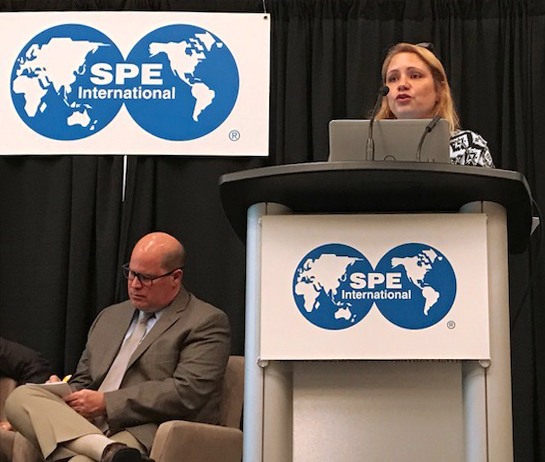Nuñez-López Discusses CO2 Capture, Utilization, and Storage at SPE event

Researcher Vanessa Nuñez-López was an invited speaker and panelist at the recent CO2 Capture, Utilization, and Storage (CCUS) Technical Section Dinner hosted by the Society of Petroleum Engineers in San Antonio. Nuñez-López, a member of the Bureau’s Gulf Coast Carbon Center, was one of three experts addressing the challenges of CCUS as an important component in climate mitigation strategies.
“Carbon capture and storage technologies have been recognized as being an essential part of the climate mitigation portfolio,” Nuñez-López said. Commenting on her current work on a project funded by the U.S. Department of Energy, she added, “I’m looking at the carbon balance of EOR [enhanced oil recovery], and I’m obtaining results that show that, being integrated, CCUS projects can actually be engineered so that the oil produced through EOR can be net carbon negative. Maybe not throughout the entire project but through perhaps half of the project. Without a doubt, enhanced oil recovery has been the main driver of CCS. It is really channeling the development of the technology globally.”
Even so, Nuñez-López believes that the recent decline in CCUS efforts worldwide indicates a need to accelerate deployment timelines to meet global objectives. “Just recently, the Global CCS Institute identified 38 large-scale, integrated CCUS projects, which is impressive. But, there were 65 just 5 years ago. So I think we all agree that the deployment of the technology has been lagging behind where it really needs to be if we want to be able to meet the Paris Agreement and meet the goals of sustainable energy.”
Others appearing on SPE’s CCUS technical panel included moderator George Koperna, chairman of the SPE CCUS Technical Section and vice president of Advanced Resources International; Concetto Fischetti, engineering director with the Oil and Gas Climate Initiative (OGCI); and Chuck McConnell, executive director of the Energy and Environment Initiative at Rice University.